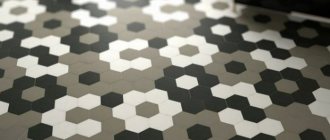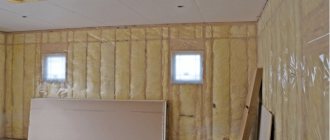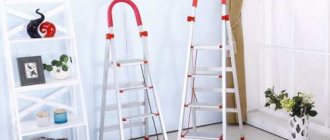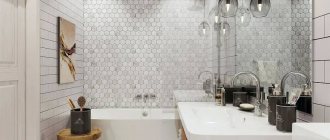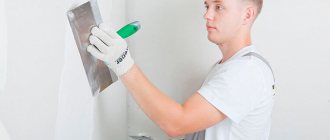To create a reliable floor in garages, you can use different materials. One option is garage floor tiles. But now many types of tile flooring material are produced. After reading the article, you can learn about what types of flooring are used in garage construction. Having become familiar with their advantages and disadvantages, it will be easier to make the right choice for a particular project. The features of laying different types of tiles are also considered, which must be taken into account when choosing a specific garage floor option.
Garage tiles are made from a variety of materials, including rubber Source jsznqg.info
No. 1. What kind of tiles should be for a garage?
Naturally, ordinary tiles, which are used to furnish kitchens and bathrooms, are definitely not suitable for a garage due to their fragility and insufficient strength. What is needed here is more reliable material that will meet the following requirements:
- resistance to mechanical loads . A heavy vehicle will drive in the same place for a long time, but the floor covering should not deform or become cracked. The floor must maintain its integrity even if a heavy tool is dropped, one way or another connected with car repairs, therefore ordinary ceramic tiles used in apartment renovations will definitely not work;
- moisture resistance . Rainy and snowy weather is not uncommon in our country. When a car drives from the street, it brings with it a sufficient amount of moisture, which can negatively affect the floor covering. Some garages offer the possibility of washing cars, i.e. The humidity will very often be high. Floor finishes must have minimal pores and low absorbency to last in such conditions;
- resistance to aggressive chemicals . A garage is a place where substances such as gasoline, diesel fuel, motor oil, antifreeze and other auto cosmetics and household chemicals are constantly stored and used. If something accidentally spills on the floor (and sooner or later something will definitely spill), the coating should not be damaged. Wood, for example, will easily absorb spills, causing its appearance and many performance qualities to suffer. Some types of tiles are also highly porous, making them completely unsuitable for use in a garage;
- resistance to low temperatures . Garages are usually not heated, so in winter the temperature there will be almost the same as outside. If the floor covering is porous, then the accumulated moisture, turning into ice, will destroy the material, i.e. again, some types of tiles are definitely not suitable;
- fire safety . There are special requirements for the room where gasoline, diesel fuel and other flammable liquids are stored. As for the floor covering, it must not be flammable and not support combustion;
- ease of care . There should be no problems here, since almost any tile is easy to clean and wash. Difficulties can only arise with an excessively textured coating, which is chosen in order to create the most non-slip floor possible;
- the aesthetic qualities of the coating are of secondary importance for most car owners. The garage should be neat, and it is better to leave the unusual design for the apartment;
- price. High-quality coating is never cheap - you should come to terms with this and not try to save too much, but there are still more and less expensive materials, so everyone can make a choice according to their own budget.
Compared to other floor coverings used to furnish a garage, tiles seem to be almost the most ideal option. A concrete floor is dusty and needs constant sweeping, a wooden floor easily absorbs liquids and is afraid of fire, and a self-leveling floor suitable for all parameters is too expensive.
All, or almost all, of the above requirements are met by several types of tiles. Let us dwell on the properties and features of each of them.
DIY porcelain tile installation
Although the process of laying porcelain tiles requires some effort and a significant investment of time, you can do it yourself.
Let's take a closer look at the installation process and the main important points:
- Leveling the surface is the first stage of work. It is not possible to lay porcelain tiles on an uneven garage floor. Professionals recommend taking the simple route: making a new screed from professional materials, and doing this work according to the instructions. If there was other flooring in the garage, you need to get rid of it. The floor must be clean and degreased before starting work.
- For a room with constant temperature changes, the expansion joint between the plates must be at least 10 mm. To do this, we insert special crosses during the work process, which will then be removed, and the seam itself is sealed with sealant and grout.
- For the garage, it is recommended to install tiles with dressing. More precisely, the middle of the tile in the new row should be at the level of the seam of the two tiles from the top row.
- Using a notched trowel, apply a layer of adhesive to the back of the porcelain tile.
- Laying begins with 2 corner slabs of the first row. We stretch the mounting cord between them to guide the installation of other slabs in height. This helps with subsequent shrinkage of the tiles.
- We lay the tile in its place, placing corners or crosses between the elements. In order for the tile to “sit” in place, you need to tap it with a rubber hammer or the back of a spatula. This is done very carefully!
- Next is grouting the seams. To do this, use a rubber spatula.
No. 2. Paving slabs
Paving slabs can be used not only to lay the area in front of the house and garden paths, but also the floor in the garage. This is a fairly budget and practical option. Concrete tiles are the most widely used. It is made from a concrete mixture that is used to fill molds. They are placed on a vibrating table, where the process of compacting the future tiles takes place (vibratory casting method). Additionally, a press can be used, which can significantly reduce compaction time (vibratory compaction method). Due to the presence of special additives in the concrete mixture, the finished material is resistant to moisture.
Main advantages :
- high resistance to mechanical loads, which is ensured by the significant thickness of the products;
- wear resistance;
- low level of slipping, which is important for a room where the floor will often get water and other liquids;
- durability;
- huge assortment. The garage can be decorated with either regular gray rectangular tiles or colored figured ones, creating an interesting pattern;
- easy installation;
- low cost, and if you take into account the combination of price and quality, then paving slabs can be considered almost the most optimal flooring option for a garage.
drawback :
- the material is hygroscopic, so it can absorb moisture. Of course, the level of hygroscopicity is not as crazy as that of wood, but not as low as that of porcelain stoneware. Manufacturers are trying to create tiles that are more and more moisture-resistant, but it is still impossible to completely get rid of porosity. This means that it is better not to use paving slabs if the garage is not heated and is located in a region with a cold climate. Also, paving slabs are not suitable for garages with constantly high levels of humidity. In addition, hygroscopicity will complicate the cleaning process.
Some types of tiles are quite expensive. If your budget is limited, then there is no point in spending money on the most expensive tiles, but it is also better not to take very cheap material, since it can be made in a handicraft industry without observing all the standards, and then you won’t have to talk about any of the advantages listed above.
General recommendations for work
The experience of many craftsmen allows us to avoid making typical mistakes during work. The tips below will help with this:
- When laying porcelain tiles for the garage, it is worth remembering that slabs laid earlier will be lower than those that are currently being installed.
- Adhesive mixtures for porcelain tiles usually harden in about 24 hours. After this, you can start grouting the joints, but full use of the garage is allowed only after 1-2 weeks. Otherwise, the tile will deteriorate.
- Before starting work, it is advisable to prepare all the necessary tools in advance and make sure that you have spatulas, grout, etc.
- It is necessary to lay porcelain stoneware for the garage floor intermittently.
- During installation, it is necessary to use a building level to ensure that the tiles lie level.
- It is necessary to cut the tiles using a grinder or a special glass cutter.
No. 3. Clinker tiles
Clinker tiles meet all the requirements for garage flooring and could be considered an ideal option if not for their relatively high cost. The material is obtained from refractory types of clay, mainly shale clay is used. For glazing, glass chips are added to the raw material. The temperature in the melting furnaces reaches 1200-13000C, due to which the pre-well-pressed raw material is sintered so well that all pores and voids disappear - it is possible to obtain a monolithic product. It is thanks to this technology that the unique properties of clinker tiles are achieved.
Advantages:
- practically zero water absorption, therefore the material does not care about rainy weather, spilled liquids and frosts;
- a high level of resistance to mechanical stress and abrasion, and when heavy objects fall, chipping is unlikely;
- resistance to chemicals;
- fire resistance. If you remember at what temperatures the material is made, it is easy to guess that clinker is not afraid of fire. At temperatures up to 18000C there is no deformation or destruction;
- durability, measured in tens of years;
- ease of care. Dirt does not accumulate in the dense structure of the tile without pores, and any spilled liquids will be very easy to clean up.
Unfortunately , there were some downsides :
- price. You have to pay for a high-quality, reliable coating, but this can be considered an investment in the future, devoid of problems with repairing the flooring in the garage;
- complexity of installation. Minimal porosity complicates the process of choosing an adhesive composition for laying tiles. You will have to be as careful as possible when choosing glue, and it will not be cheap;
- A small range of colors and shapes could be considered a disadvantage when arranging a floor in a living room or when choosing a material for a front yard, but when it comes to a garage, performance comes to the fore. It is enough that clinker tiles look nice and on its basis you can create a neat, discreet and, most importantly, durable coating.
If your budget allows, then feel free to choose clinker tiles - they will faithfully serve for many years in a row. If finances are limited, then you will have to consider other options.
Mandatory base treatment
Processing the base is a mandatory stage of preparatory work. Without this, the quality of installation will significantly decrease, and the performance characteristics of the material will deteriorate. To do this you need:
- Pits and potholes are covered with an adhesive mixture. All recesses must first be wetted with water.
- Removing oil stains.
- Repairing decaying areas and cleaning them.
After preparation, the floor should be allowed to dry. Only after this do they begin laying porcelain tiles. Dust and dirt must be removed before starting work.
No. 4. Porcelain tiles
Porcelain tiles are ideal for use in garages. It is possible to classify the material as tile only with a stretch, since porcelain stoneware is close in properties to natural stone, and in some characteristics even surpasses it. It is produced on the basis of clay, sand, mica, feldspar and granite chips. All components are mixed, pressed at high pressure and fired in an oven at a temperature of 1200-13000C. The result is a material that is almost completely devoid of pores (like clinker tiles). The unique composition allows us to achieve record strength: 3 mm thick tiles can withstand loads of up to 200 kg/cm2. It is not surprising that porcelain stoneware is considered almost the most suitable material for a garage.
Advantages:
- high strength and wear resistance. The material can easily withstand the load from a car constantly driving through the same place, and the fall of a heavy tool will not be fatal for it;
- almost complete absence of moisture absorption, therefore precipitation, car washing, spilled liquids are not dangerous for porcelain tiles;
- frost resistance. Due to the absence of pores, porcelain stoneware easily withstands low temperatures and temperature changes, maintaining its integrity;
- ease of care. There are no pores - there is no dirt in them, so maintaining cleanliness will be very simple;
- resistance to chemicals;
- fire safety;
- durability;
- wide variety and the ability to create an aesthetic coating to suit every taste.
There are disadvantages to porcelain stoneware:
- high price;
- difficulties during transportation due to the large weight and fragility of the material;
- difficulties during installation due to low porosity and resulting poor adhesion with many adhesive compositions, therefore the choice of adhesive should be approached with extreme caution. In addition, porcelain stoneware does not cut well, which further complicates installation;
- low thermal insulation qualities.
The range of porcelain tiles is impressive, but for a garage it is better to choose material with a matte surface - glazed specimens look nice, but in the garage scratches will quickly appear on the surface, and the coating will look sloppy.
We grout the joints
Expansion joints can be sealed with any sealant. A day after the glue dries, the final grouting of the tile joints is carried out. The mixture is applied with a rubber spatula or grater. The remaining mixture is removed immediately.
After installation is completed, it is recommended to check the gate for free movement. The floor is ready for full use in 2-3 weeks.
When installing porcelain tiles on the garage floor, some craftsmen create a slight slope. This will allow you to wash the car right in the box. For drainage, a container is provided in the middle or a storm drain at the entrance. A significant advantage of floor tiles is that there is no need for major repairs of the entire floor. If one segment is damaged, it can be easily replaced with a new one.
Using cheaper materials is only a one-time saving. Renewing a leaking floor or walls every year is not very exciting. Alterations are not cheap either. To avoid mistakes, approach all stages of work responsibly. If you are not confident in your abilities, invite a specialist. Laying porcelain tiles is a labor-intensive and technically complex process. Maybe choose a rubber coating for the garage?
No. 5. Rubber tiles
Rubber tiles are inferior in popularity to other types of tiles, but in terms of their overall performance qualities they are excellent for use in the garage. The material is produced on the basis of rubber crumbs with the addition of dyes and modifiers. Rubber tiles are used for arranging industrial premises, and recently they have begun to be used for organizing flooring in garages.
Advantages:
- excellent resistance to mechanical and shock loads. Even a heavy tool, if it falls, will not split the coating, and the car will not leave any damage on it;
- high level of moisture resistance. Rubber tiles are an ideal solution for a garage where you will need to periodically wash your car. She is not afraid of frost and temperature changes;
- ease of installation. Individual tiles are connected to each other thanks to special grooves;
- good soundproofing qualities - if a heavy tool falls on the floor, the noise will be insignificant. There will definitely not be such a roar as when falling on clinker tiles or porcelain tiles;
- non-slip surface. Even if there is a puddle of water on the floor, it will be difficult to slip, and this is very important from a safety point of view;
- ease of care;
- wide choice of shapes, colors and sizes.
Among the disadvantages we note:
- rubber tiles are relatively easy to ignite and burn. For the garage, you need to take those products that contain substances that impede combustion;
- price. Rubber tiles are not the most expensive, but not the cheapest coating either;
- instability to some chemicals;
- Although the process of installing tiles is relatively simple, it is necessary to prepare a perfectly flat and durable base for the coating.
Preparatory stage
At this stage, the surface is leveled. Height differences of more than 1.5 cm are eliminated using a concrete screed. Small differences are leveled out during installation of the floor covering by applying a thicker layer of adhesive.
When installing a heated floor with porcelain stoneware, the preparatory stage includes:
- waterproofing material flooring;
- installation of heated floor elements;
- surface concreting;
- solidification of the solution;
- treating the floor with an antiseptic and primer;
- surface drying.
If the old floor was wooden, it should be dismantled and replaced with new boards. But a more expedient solution would be to replace the wooden flooring with a concrete base. You can either create a new concrete floor or pour expanded clay with concrete, which fills the space between the joists.
No. 6. Acid resistant tiles
This material makes sense to use if the garage is not only a place to park a car, but also a space where various types of repair processes often and actively take place. Tiles are made from fire-resistant clays with the addition of substances that increase the material’s resistance to various types of negative influences.
Pros:
- wear resistance and strength, resistance to mechanical loads. If the material can withstand the weight of factory machines and their vibration, then it can easily withstand the weight of a car;
- the material practically does not absorb moisture;
- resistance to aggressive substances;
- frost resistance and resistance to temperature changes due to low porosity;
- easy to maintain, because the non-porous surface of the tile does not absorb dirt and grease.
Minuses:
- simple design and small range;
- difficulties in choosing an adhesive composition.
Characteristics of flooring
Technical porcelain tiles have the following properties:
- wear resistance;
- strength (withstands a load of 200 kg / 1 cm²);
- frost resistance;
- low porosity;
- low heat dissipation;
- excellent moisture resistance;
- absolute fire safety.
Porcelain tiles are easy to care for. If proper care is provided, the service life of the cladding product will reach 50 years. The coating does not deform during temperature fluctuations.
This facing material also has disadvantages. The main disadvantage is the fragility of the floor covering. Therefore, special attention should be paid to the correct transportation of the cladding product. You should not use porcelain tiles in a garage that is not heated. This is explained by the fact that this flooring material is characterized by minimal thermal insulation qualities.
To carry out the work efficiently, you will need the following materials and tools:
- the facing material itself;
- special glue;
- concrete solution;
- grout for seams;
- building level;
- roulette;
- Bulgarian;
- 2-3 diamond discs;
- construction mixer;
- serrated and rubber spatulas;
- Master OK;
- rubber hammer;
- container for working mixture;
- plastic crosses for seams.
The technology for installing a porcelain stoneware floor is similar to laying any floor covering. A distinctive feature of the material is its heavy weight. For this reason, it will be necessary to use a special glue, which should reliably connect the finishing cladding to the subfloor.
There is another problem that you may encounter during installation work. It is associated with the high strength of porcelain stoneware, which, if necessary, will complicate the process of cutting it.
